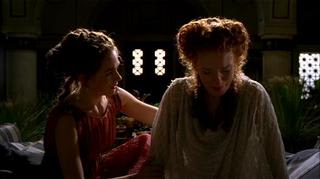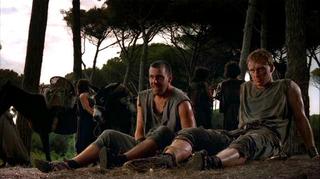
As this episode opens, everyone is recovering from earlier events and preparing for the coming battle. We see dead bodies on a beach, washed up from the shipwreck Boring Soldier and Dodgey Soldier were caught in at the end of the last episode. Boring and Dodgey themselves have, of course, survived. In ‘Caesar’s camp in Greece’, Caesar is putting up with some snark from his slave. Pompey’s lot are feeling confident (and are colour coded for your convenience – they were a bluey-greeny colour, Caesar and Antony wear red. Even Cato has got out of his robe and sandals and into a uniform). Cato is all for attacking Caesar and walking in his blood, Pompey is less convinced. The town crier informs all of Rome that Caesar is surrounded and outnumbered, which panics Atia into sending Octavia to ask Servilia for some guards to protect them when Pompey’s troops come marching back, victorious. Octavia doesn’t want to go and has ceased to care about her own potential ravishment and murder in her desperation for the whole thing to be over (and she’s hiding the fact that Servilia’s been flirting with her). Niobe’s sister comes over to make up, which is nice.
Boring and Dodgey have washed up on a sand bank in the middle of the sea. When Boring tells him not to bother fishing as they’ll die of thirst first, Dodgey suggests drinking the blood of the dead men, but Boring suggests this will be too salty. Boring seems to have decided to sit on the beach and die, while Dodgey is at least trying to do something about it.
Octavia is doing herself up for Servilia. She bursts into tears in front of Servilia, who tries to comfort her, but Octavia runs away before she can get any further. And thus begins Rome’s second most ludicrous, sex-for-the-sake-of-it, storyline (the first comes in an episode or two and also involves Octavia). Servilia was one of Caesar’s favourite mistresses and Octavia was the holier-than-thou, all too virtuous sister of Octavian. Both of them were, by all accounts, heterosexual. But, according to Rome, the two of them had a sexual relationship with each other.
In fairness to the writers, there is an argument to be made for this sort of invention. Roman writers usually recorded a man’s sexual preferences, but since they were writing for and about men, they hardly ever recorded instances of women having sexual relationships with other women. If a woman was unfaithful to her husband with a man (and was caught) that might be recorded, but since a sexual relationship with another woman cannot produce illegitimate
 children, it was of little interest and was rarely written about, though Sappho’s poetry was much admired. So it is entirely possible that some Roman women had sexual relationships with each other that we don’t know about and it could be a really interesting area to explore. But these particular women, who were little connected with each other in real life, seem a very odd choice and there seems to be no good reason for including this relationship other than titillation.
children, it was of little interest and was rarely written about, though Sappho’s poetry was much admired. So it is entirely possible that some Roman women had sexual relationships with each other that we don’t know about and it could be a really interesting area to explore. But these particular women, who were little connected with each other in real life, seem a very odd choice and there seems to be no good reason for including this relationship other than titillation.Caesar thinks his advantage in the battle is that they must win or die, whereas Pompey’s men have other options (running away, presumably). There is lots of ponderous washing of the face and putting on of armour on both sides, and Caesar shows how tough he is by cutting his own hand for no particular reason (presumably it’s supposed to be a religious ritual of some kind, but he’d be better off sacrificing a goat in that case, not cutting his own hand – a little bit of his blood isn’t much use to the gods).
The battle is represented by some blurry, slow-motion waving of swords, and takes about two seconds. Rome had a much, much bigger budget than I, Claudius or Spartacus: Blood and Sand but it was still only a television budget and that really shows here – I, Claudius’ verbal reports of battles were less incongruous than this. The sheer brevity of the scene, which covers one of the most important battles of the Civil War, makes it seem ridiculous and obviously done on the cheap – I would have preferred a slightly longer description by one bloodied soldier or messenger if actual fighting was too expensive.
Caesar wins and Pompey is very upset. So he sits under a tree for a bit.
Cato is heading off to Africa for money and soldiers, convinced they’re not beaten until dead. Brutus and Cicero, however, have had enough and are off to surrender to Caesar. Cicero insists that he is not afraid to die, just tired and fed up. Brutus appears to be fed up of the food. Even Cato has abandoned Pompey, insisting they should travel separately.
Boring Soldier is looking forward to seeing his mum again in the afterlife and Dodgey wonders if they have a system for finding people (he’s obviously never seen A Matter of Life and Death, where the afterlife is extremely well organised). Boring isn’t that keen to see his mum, though, as he abruptly changes his mind when he realises the potential of floating corpses as raft-building material.
Pompey is travelling incognito and arguing with his nose-less guide. Back in Rome, Octavia is masturbating and praying (not both at once) which we are presumably supposed to attribute to her feelings for Servilia. I’m not sure why she’s praying so much, lesbianism was not of sufficient interest to male Roman writers to bother prohibiting it and Sappho was positively admired. We’re several decades before Christianity and she’s not Jewish, so why is she so upset about it? She then pops over to Servilia’s to ‘do some weaving’. Actual looms have been set up but weaving is not entirely in evidence. While they’re flirting, a slave brings word of Caesar’s victory, but does not know what has happened to Brutus. Octavia goes to comfort Servilia and, of course, kissing ensues because on television it is impossible to comfort someone without kissing them.
Back to Greece again, where Cicero and Brutus surrender to Caesar, who responds by hugging them and grinning like a loon (maybe because Brutus really is his son?). Caesar was expecting Pompey, if still alive, to surrender and is baffled that they haven’t. Boring and Dodgey have, of course, run straight into Pompey, whom Dodgey recognises. Noseless tries to get Boring and
 Dodgey to join him in betraying Pompey and claiming a reward, so Boring kills him. Boring then tries to claim Pompey as a prisoner of the 13th Legion, despite the fact he and Dodgey are the only members of that Legion present. Pompey explains that he lost the battle because some of his men bolted and begs Boring to let him take his wife and children to Egypt for safety, to which Boring agrees because he is secretly on Pompey’s side anyway.
Dodgey to join him in betraying Pompey and claiming a reward, so Boring kills him. Boring then tries to claim Pompey as a prisoner of the 13th Legion, despite the fact he and Dodgey are the only members of that Legion present. Pompey explains that he lost the battle because some of his men bolted and begs Boring to let him take his wife and children to Egypt for safety, to which Boring agrees because he is secretly on Pompey’s side anyway.Octavia and Servilia have done the sex, somewhat surprisingly off screen (presumably this is bait to get people to tune in next time). Boring and Dodgey take a horse and some money and head off, Dodgey haranguing Boring all the way for letting Pompey go and denying them rich rewards from Caesar, while Boring complains that Pompey is not a slave to be sold. At the camp, Caesar tells the two of them that they are among only 14 survivors of the storm. And then Boring does the most ridiculously honourable and completely implausible thing he does throughout the series (and he does this sort of thing a lot) – he tells Caesar that they bumped into Pompey but let him go because ‘it would be wrong’ to capture him (he is at least good enough to leave Dodgey out of this insane notion). This is utterly, utterly ridiculous. Letting Pompey go was bad enough in itself, but going and telling Caesar about it is suicide. Caesar points out that he pretty much needs Pompey dead, otherwise people will still fight for him, and then lets them go with a warning that only he gets to be merciful. When they have left, he tells Antony that he thinks the two of them have powerful gods on their side and he doesn’t want to harm them for fear of offending said gods. This is equally silly. Caesar rarely referred to religion or the gods in his writing (I can tell you for a fact that he does not record a single prophetic dream in any of his works!). He did not, it would seem, consider ideas about the gods to be relevant to military strategy. So why would he be swayed by the notion that someone might be protected by the gods when they’d just let his mortal enemy go? It's lazy writing, using the fact that other Roman writers sometimes suggested that ideas about not wanting to offend the gods might motivate action to cover up for a really silly plot development. Basically, the whole scene completely disregards any kind of logic purely for the sake of keeping Boring and Dodgy alive when they shouldn’t be. Their encounter with Pompey itself is no more than an excuse to have Pompey interact with our Everyday Heroes – it would have been better and more logical to have Pompey express his despair to his wife.
Pompey’s ship arrives in Egypt and he takes a boat to go ashore, where he is promptly stabbed and then beheaded by a former legionary, in front of his wife and children, watching from the boat.
Since this episode is called ‘Pharsalus’, the lack of an actual battle or any detailed description of the battle is a bit of a disappointment, but the ending is very good. Pompey’s death is very well staged and
 shot, capturing both the indignity of it and the high tragedy, reflected in his wife and children witnessing it. Octavia and Servilia’s relationship makes no sense to me because I don’t see any strong narrative reason for it, and Boring is at his most ridiculously, suicidally pompous, but that ending pulls it all back up and has me eager to see the next episode, where we get to meet Cleopatra.
shot, capturing both the indignity of it and the high tragedy, reflected in his wife and children witnessing it. Octavia and Servilia’s relationship makes no sense to me because I don’t see any strong narrative reason for it, and Boring is at his most ridiculously, suicidally pompous, but that ending pulls it all back up and has me eager to see the next episode, where we get to meet Cleopatra.




No comments:
Post a Comment